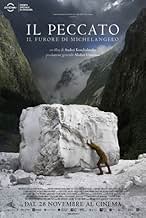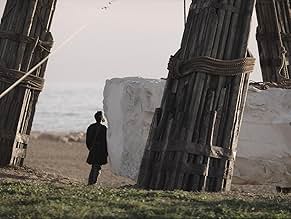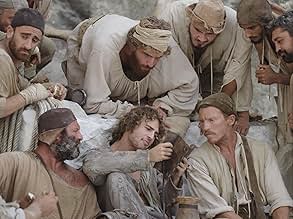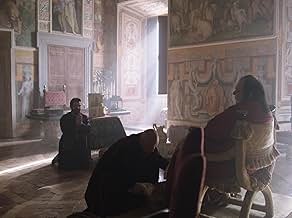IMDb RATING
6.8/10
1.5K
YOUR RATING
The life of Michelangelo Buonarroti.The life of Michelangelo Buonarroti.The life of Michelangelo Buonarroti.
- Director
- Writers
- Stars
- Awards
- 3 wins & 2 nominations total
- Director
- Writers
- All cast & crew
- Production, box office & more at IMDbPro
Featured reviews
The main thing I would like to point out is that every single scene from this movie was like a beautiful painting straight out of an Italian museum. I can't remember when was the last time the visuals of a movie stunned me so greatly that I was with each scene change surprised by the beauty of the images.
Secondly, the feeling I get reading the rest of the reviews, and hearing other people comment on the movie, is that that people almost expect this movie to be a some sort of thriller depicting the genius of Michelangelo, the person we all know as the one of the worlds greatest artists of all time. But the greatness of this movie is in the contrary - Michelangelo is portrayed as a mere, sinning human - who steals, betrays, lies, and also hates showering. He is a imperfect person just like any other, haunted by his fears and suspicions and I can't shake off the feeling that people did not (or did not want) to see Michelangelo in those lens. But for me that is the main thing that makes this movie so great - the viewer can share Michelangelos' emotions and thoughts as if they were their own or of their friend, since the artists is another common, but very talanted man, and not some untouchably skilled alien of the past.
Thirdly, the movie shows us only a fragment of the artists life, and a fragment describing the very beginning of the sculpting process, and it is that time that the fullness of Michelangelos' character can be met, like it is in the movie. Who wants to see a historical documentary about his whole life? You can tune into the History channel if your into that. On the other side, the movie is an artistic take at an artists life, excellently describing Michelangelos true identity, his problems and thoughts, related or not to his work.
For me, the point and the idea of the movie is that Michelangelos works such as David and Pieta were not thought up in the vast and luxuriose castles and churches of Florence, while the artists was enjoying a cup of tea snf reading philospophy, but instead, in the middle of a marble mine in high up in the mountains, alongside plain working men, when the idea arises in sight of a mere daughter of one of the workers leans on a marble rock for a short afternoon sleep - it is that plain scene which inspires the divine masterpiece of the artists work today. This is what makes the movie so down to earth and realistic, and in combination with the incredible scenery, makes the viewer feel like he is in 16th century Italy for two hours.
Secondly, the feeling I get reading the rest of the reviews, and hearing other people comment on the movie, is that that people almost expect this movie to be a some sort of thriller depicting the genius of Michelangelo, the person we all know as the one of the worlds greatest artists of all time. But the greatness of this movie is in the contrary - Michelangelo is portrayed as a mere, sinning human - who steals, betrays, lies, and also hates showering. He is a imperfect person just like any other, haunted by his fears and suspicions and I can't shake off the feeling that people did not (or did not want) to see Michelangelo in those lens. But for me that is the main thing that makes this movie so great - the viewer can share Michelangelos' emotions and thoughts as if they were their own or of their friend, since the artists is another common, but very talanted man, and not some untouchably skilled alien of the past.
Thirdly, the movie shows us only a fragment of the artists life, and a fragment describing the very beginning of the sculpting process, and it is that time that the fullness of Michelangelos' character can be met, like it is in the movie. Who wants to see a historical documentary about his whole life? You can tune into the History channel if your into that. On the other side, the movie is an artistic take at an artists life, excellently describing Michelangelos true identity, his problems and thoughts, related or not to his work.
For me, the point and the idea of the movie is that Michelangelos works such as David and Pieta were not thought up in the vast and luxuriose castles and churches of Florence, while the artists was enjoying a cup of tea snf reading philospophy, but instead, in the middle of a marble mine in high up in the mountains, alongside plain working men, when the idea arises in sight of a mere daughter of one of the workers leans on a marble rock for a short afternoon sleep - it is that plain scene which inspires the divine masterpiece of the artists work today. This is what makes the movie so down to earth and realistic, and in combination with the incredible scenery, makes the viewer feel like he is in 16th century Italy for two hours.
Nice work with beautiful scenes recreating the atmosphere of those times perfectly well.
Michaelangelo was a genius sculptor and each of his creations move the soul even of modern people, lots of whom have hardly any taste of art at all. This film is artistic enough, beautiful and talented, made by a very professional director of soviet school. Just the right background to tell a story of a genius.
No soundtrack can also mean no noise pollution. I enjoyed everything about this movie
Knowledge. Loyalty. Truthfulness. Guilt. Perseverance. Effort. Strength. Love. Spirituality.
If you want to learn a thing or two about the above, it's a must to watch.
Up until the final scene, Il Peccato seems a beautiful chaos, with an apparently random series of scenes that seem to go nowhere in particular. But, alas, the finale might be enlightening.
Konchalovsky's film obviously echoes Andrei Rublev, even though it can't be but a shadow if compared to Tarkovsky's masterwork, by portraying Michelangelo as a troubled artist that feels out of place in his brutal times. Unlike Rublev, Michelangelo is however torn by less religious themes, even though he too complains about the brutality of his commissioners, the Della Rovere and the Medici families. Always in economic difficulties, always aspiring to a sublime that he identifies in poet Dante Alighieri, never able to settle in one place, fueled by an inner omnipresent rage. Ultimately, Michelangelo's titular 'sin' is not revealed, but it might be pride: he makes no secret of how he considers himself to be a genius far above anyone else, he tries to do overly impossible things without accomplishing them entirely. A physical representation of his pride might constitute the huge marble block seen in the poster, that pays a specific role in part of the film.
The cast is made up of less well-known italian actors, but Alberto Testa in particular seems the perfect choice in terms of appearance to play the Renaissance Sculptor. Equally particular is the choice to shoot the movie in 4:3 aspect ratio. The coloring however somehow reminded of Sokurov's Faust.
As a biopic about Michelangelo, it will most likely leave you with more questions about the man that you initially had. The narrative is very cryptic and revolves around him trying to balance his art around commissions and orders he has no hope of actually fulfilling.
Most of the movie is spent on "the monster," a marble block he considers more important than any of his responsibilities or desires. But when it comes down to actually watching the transportation, it is just an accident waiting to happen. You know that it's coming, and yet it is surprising nonetheless when it does.
The plot is stitched with bits and pieces of his life and relationships with multiple Popes he lived through. It only makes sense if you already know anything there is to know about his biography. The movie will not bother establishing differences between the pope factions or highlighting the significance of the events. You are on your own in this one.
His character also becomes more confusing as it goes along, his clear perfectionism and suspicion of everyone stem from vaguely alluded conspiracies around him that start and end abruptly, sometimes in the same scenes. His obsession with the monster and willingness to betray everyone and everything for it is captivating, however, his revelation at the end just seems way too nebulous for it to be understood by anyone except him, and maybe this is how it should be. The best aspect of Michelangelo that the movie so carefully and authentically portrays is that, despite looking like a local madman who has to beg on a street, he was never poor; his tight-fistedness is something of a legend in and of itself. Including a chest full of ducats under his bed that he just doesn't spend while living in what amounts to poverty.
Speaking of which, the mise-en-scene of the medieval cities is impeccable. It's one of those ultra-authentic dirty movies that doesn't resort to erasing color everywhere to show the dirt. No, everything can be vibrant while the roads are made of layers upon layers of mud. That's not a contradiction. Everyone is sweaty with their unwashed clothes full of holes and tears. All this only highlights the absolute beauty of his creations.
Most of the movie is spent on "the monster," a marble block he considers more important than any of his responsibilities or desires. But when it comes down to actually watching the transportation, it is just an accident waiting to happen. You know that it's coming, and yet it is surprising nonetheless when it does.
The plot is stitched with bits and pieces of his life and relationships with multiple Popes he lived through. It only makes sense if you already know anything there is to know about his biography. The movie will not bother establishing differences between the pope factions or highlighting the significance of the events. You are on your own in this one.
His character also becomes more confusing as it goes along, his clear perfectionism and suspicion of everyone stem from vaguely alluded conspiracies around him that start and end abruptly, sometimes in the same scenes. His obsession with the monster and willingness to betray everyone and everything for it is captivating, however, his revelation at the end just seems way too nebulous for it to be understood by anyone except him, and maybe this is how it should be. The best aspect of Michelangelo that the movie so carefully and authentically portrays is that, despite looking like a local madman who has to beg on a street, he was never poor; his tight-fistedness is something of a legend in and of itself. Including a chest full of ducats under his bed that he just doesn't spend while living in what amounts to poverty.
Speaking of which, the mise-en-scene of the medieval cities is impeccable. It's one of those ultra-authentic dirty movies that doesn't resort to erasing color everywhere to show the dirt. No, everything can be vibrant while the roads are made of layers upon layers of mud. That's not a contradiction. Everyone is sweaty with their unwashed clothes full of holes and tears. All this only highlights the absolute beauty of his creations.
Did you know
- TriviaShot entirely in Italy. The movie was shot in Rome and its environs and in Tuscany, including at the Carrara quarry where Michelangelo got his marble.
- Quotes
Michelangelo Buonarroti: Money always rubs elbows with infamy.
- ConnectionsReferenced in Vecherniy Urgant: Andrei Konchalovsky/Pompeya (2019)
- How long is Sin?Powered by Alexa
Details
Box office
- Budget
- €15,000,000 (estimated)
- Gross worldwide
- $243,043
- Runtime2 hours 14 minutes
- Color
- Aspect ratio
- 1.33 : 1
Contribute to this page
Suggest an edit or add missing content


![Watch Trailer [OV]](https://m.media-amazon.com/images/M/MV5BYThkZDVkMGQtNGZiYS00NzMwLWFkOWUtYTFhYThiN2E4MTQwXkEyXkFqcGdeQXRyYW5zY29kZS13b3JrZmxvdw@@._V1_QL75_UX500_CR0)











